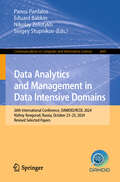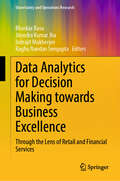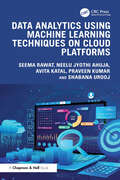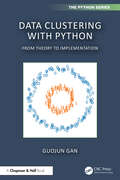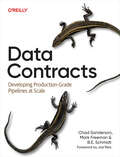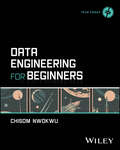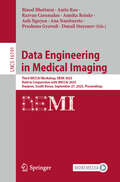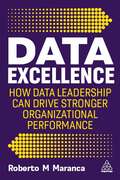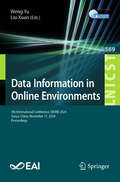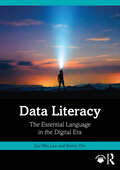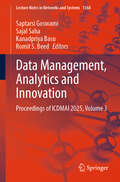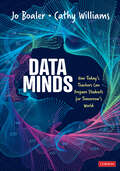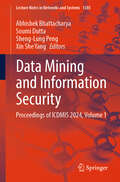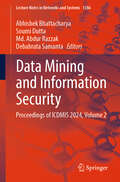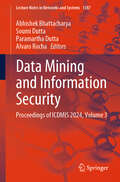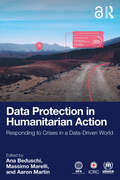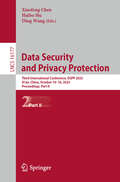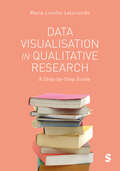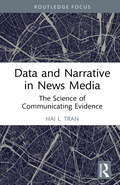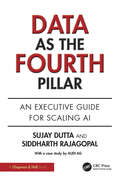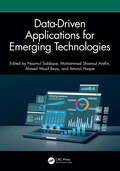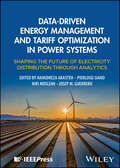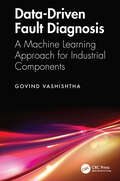- Table View
- List View
Data Analytics and Management in Data Intensive Domains: 26th International Conference, DAMDID/RCDL 2024, Nizhny Novgorod, Russia, October 23–25, 2024, Revised Selected Papers (Communications in Computer and Information Science #2641)
by Eduard Babkin Panos Pardalos Sergey Stupnikov Nikolay ZolotykhThis book includes the revised selected papers from the 26th International Conference on Data Analytics and Management in Data Intensive Domains, DAMDID/RCDL 2024, held in Nizhny Novgorod, Russia, during October 22-25, 2024. The 15 full papers and 5 short papers presented in this volume were carefully reviewed and selected from 71 submissions. They focus on Conceptual Modeling and Ontologies; Generative and Transformer-Based Models; Machine Learning Methods and Applications and Statistical Methods and Applications.
Data Analytics for Decision Making towards Business Excellence: Through the Lens of Retail and Financial Services (Uncertainty and Operations Research)
by Raghu Nandan Sengupta Bhaskar Basu Jitendra Kumar Jha Indrajit MukherjeeThis edited volume collates discussions on latest challenges, opportunities, trends and practices applicable to two major business sectors -- retail and financial services -- and chapters are segregated accordingly. It explores how these sectors are increasingly becoming data-intensive, and how ways of handling, manipulating, exploiting and evaluating data continues to change in this era of big data. Part A of the book looks into better understanding of marketing metrics/ strategy/ theory and practice using retail analytics. Topics being explored are: inventory, assortment, and promotion effectiveness; pricing strategies; brand/category switching and customer loyalty; customer profitability; customer engagement; cross-buying and up-buying; synergistic effects of online and offline channels and retail innovations; effectiveness of different type of distribution channels; customer experience; service excellence/failure/recovery; digitalizationin retailing; consumer behaviour and marketing in omni-channel retail environments. In Part B, topics of relevance include financial aspects of data analytics such as: behavioral data finance; Big data and credit risk; data analytics and financial econometrics; financial sentiment and news analysis; information and evidence in digital age; policy-making mechanisms and modelling approaches; stock market manipulation detection; stock market trading strategies using data analytics; high frequency/ algorithmic trading with AI; financial forecasting including interest rate/ old price/ crude oil/ macroeconomic variables/ FOREX/ cryptocurrency price; deep learning for finance and insurance applications. The book covers diverse and advanced concepts with practical examples to supplement and complement varied topics of interest within the domain. Thus students, researchers, and practitioners will undoubtedly find novel and new ideas for data analytics in the realm of two critical domain areas: retail and financial services.
Data Analytics using Machine Learning Techniques on Cloud Platforms
by Shabana Urooj Praveen Kumar Avita Katal Neelu Jyothi Ahuja Seema RawatData Analytics using Machine Learning Techniques on Cloud Platforms examines how machine learning (ML) and cloud computing combine to drive data-driven decision-making across industries. Covering ML techniques, loud-based analytics tools and security concerns, this book provides theoretical foundations and real-world applications in fields like healthcare, logistics and e-commerce. It also addresses security challenges, privacy concerns and compliance frameworks, ensuring a comprehensive understanding of cloud-based analytics. This book: Covers supervised and unsupervised learning, including regression, clustering, classification and neural networks Discusses Hadoop, Spark, Tableau, Power BI and Splunk for analytics and visualization Examines how cloud computing enhances scalability, efficiency and automation in data analytics Showcases ML-driven solutions in e-commerce, supply chain logistics, healthcare and education This book is an essential resource for students, researchers and professionals who seek to understand and apply ML-driven cloud analytics in real-world scenarios.
Data Clustering with Python: From Theory to Implementation (Chapman & Hall/CRC The Python Series)
by Guojun GanData clustering, an interdisciplinary field with diverse applications, has gained increasing popularity since its origins in the 1950s. Over the past six decades, researchers from various fields have proposed numerous clustering algorithms. In 2011, I wrote a book on implementing clustering algorithms in C++ using object-oriented programming. While C++ offers efficiency, its steep learning curve makes it less ideal for rapid prototyping. Since then, Python has surged in popularity, becoming the most widely used programming language since 2022. Its simplicity and extensive scientific libraries make it an excellent choice for implementing clustering algorithms.Features: Introduction to Python programming fundamentals Overview of key concepts in data clustering Implementation of popular clustering algorithms in Python Practical examples of applying clustering algorithms to datasets Access to associated Python code on GitHub This book extends my previous work by implementing clustering algorithms in Python. Unlike the object-oriented approach in C++, this book uses a procedural programming style, as Python allows many clustering algorithms to be implemented concisely. The book is divided into two parts: the first introduces Python and key libraries like NumPy, Pandas, and Matplotlib, while the second covers clustering algorithms, including hierarchical and partitional methods. Each chapter includes theoretical explanations, Python implementations, and practical examples, with comparisons to scikit-learn where applicable.This book is ideal for anyone interested in clustering algorithms, with no prior Python experience required. The complete source code is available at: https://github.com/ganml/dcpython.
Data Contracts: Developing Production-Grade Pipelines at Scale
by Mark Freeman Chad Sanderson B. E. SchmidtPoor data quality can cause major problems for data teams, from breaking revenue-generating data pipelines to losing the trust of data consumers. Despite the importance of data quality, many data teams still struggle to avoid these issues—especially when their data is sourced from upstream workflows outside of their control. The solution: data contracts. Data contracts enable high-quality, well-governed data assets by documenting expectations of the data, establishing ownership of data assets, and then automatically enforcing these constraints within the CI/CD workflow. This practical book introduces data contract architecture with a clear definition of data contracts, explains why the data industry needs them, and shares real-world use cases of data contracts in production. In addition, you'll learn how to implement components of the data contract architecture and understand how they're used in the data lifecycle. Finally, you'll build a case for implementing data contracts in your organization. Authors Chad Sanderson, Mark Freeman, and B.E. Schmidt will help you: Explore real-world applications of data contracts within the industry Understand how to apply each component of this architecture, such as CI/CD, monitoring, version control data, and more Learn how to implement data contracts using open source tools Examine ways to resolve data quality issues using data contract architecture Measure the impact of implementing a data contract in your organization Develop a strategy to determine how data contracts will be used in your organization
Data Engineering for Beginners (Tech Today)
by Chisom NwokwuA hands-on technical and industry roadmap for aspiring data engineers In Data Engineering for Beginners, big data expert Chisom Nwokwu delivers a beginner-friendly handbook for everyone interested in the fundamentals of data engineering. Whether you're interested in starting a rewarding, new career as a data analyst, data engineer, or data scientist, or seeking to expand your skillset in an existing engineering role, Nwokwu offers the technical and industry knowledge you need to succeed. The book explains: Database fundamentals, including relational and noSQL databases Data warehouses and data lakes Data pipelines, including info about batch and stream processing Data quality dimensions Data security principles, including data encryption Data governance principles and data framework Big data and distributed systems concepts Data engineering on the cloud Essential skills and tools for data engineering interviews and jobs Data Engineering for Beginners offers an easy-to-read roadmap on a seemingly complicated and intimidating subject. It addresses the topics most likely to cause a beginning data engineer to stumble, clearly explaining key concepts in an accessible way. You'll also find: A comprehensive glossary of data engineering terms Common and practical career paths in the data engineering industry An introduction to key cloud technologies and services you may encounter early in your data engineering career Perfect for practicing and aspiring data analysts, data scientists, and data engineers, Data Engineering for Beginners is an effective and reliable starting point for learning an in-demand skill. It's a powerful resource for everyone hoping to expand their data engineering Skillset and upskill in the big data era.
Data Engineering in Medical Imaging: Third MICCAI Workshop, DEMI 2025, Held in Conjunction with MICCAI 2025, Daejeon, South Korea, September 27, 2025, Proceedings (Lecture Notes in Computer Science #16191)
by Danail Stoyanov Binod Bhattarai Anita Rau Anh Nguyen Ana Namburete Razvan Caramalau Annika Reinke Prashnna GyawaliThis book constitutes the proceedings of the Third MICCAI Workshop on Data Engineering in Medical Imaging, DEMI 2025, held in conjunction with the 28th International conference on Medical Image Computing and Computer Assisted Intervention, MICCAI 2025, in Daejeon, South Korea, on September 27, 2025. The 24 full papers included in this book were carefully reviewed and selected from 33 submissions. These papers focus on the topic of data engineering in medical imaging and address open questions in the field. The workshop welcomes various approaches such as data and label augmentation, active learning and active synthesis, federated learning, multimodal learning, self-supervised learning, and large-scale data management and data quality assessment.
Data Excellence: How Data Leadership Can Drive Stronger Organizational Performance
by Roberto M MarancaHow can data leaders build long-term value in the era of AI? Data Excellence by Roberto Maranca is the strategic guide for Chief Data Officers, VPs, Directors and consultants responsible for delivering sustained, measurable data performance. Combining tactical insight with long-term vision, this book shows how to embed data leadership across the enterprise and drive real organizational value, beyond just tools or tech.Framing the data leader as a performance coach, it offers a clear methodology for building scalable data capabilities that align with AI-driven transformation, governance and business goals. You'll learn how to: - Build a culture of data performance through behavior and mindset shifts - Strengthen change execution and align initiatives across business units - Deliver measurable value through data productization and cost-benefit analysis - Evaluate risk and control functions across the data lifecycle - Apply performance diagnostics including use-case readiness and initiative mapping With practical tools and strategic depth, Data Excellence equips senior data leaders to future-proof their organizations and lead with impact in an increasingly AI-powered landscape.Themes include: data leadership, organizational performance, AI-era transformation, data culture, value generation, data governance
Data Information in Online Environments: 5th International Conference, DIONE 2024, Sanya, China, November 11, 2024, Proceedings (Lecture Notes of the Institute for Computer Sciences, Social Informatics and Telecommunications Engineering #569)
by Weng Yu Liu XuanThis book constitutes the refereed proceedings of the 5th International Conference on Data and Information in Online, DIONE 2024, held in Sanya, China, during November 1–3, 2024. The 34 full papers were presented in this volume were carefully reviewed and selected from 99 submissions. They focus on Machine Learning and Artificial Intelligence; Optimization and Intelligent Systems; Privacy, Security, and Risk Management; Emerging Applications and Interdisciplinary Research.
Data Literacy: The Essential Language in the Digital Era
by Sau Wai Law Benny YimData has been called the ‘new oil’ of the 21st-century economy, yet knowledge of how to harness and comprehend data is lagging. This book presents a comprehensive guide for university students and business practitioners to acquire the core competencies to become data literate.Data Literacy: The Essential Language in the Digital Era introduces a logical way to master the nature, features, characteristics, limitations, uses, and protection of data, as well as its legal, regulatory, and ethical concerns. The book helps readers to develop their data literacy skills, based on lessons learnt from the authors’ professional experience in the banking and education sectors, together with doctrinal and empirical findings from research and observation.With a structured methodology for interpreting data, practical case studies, and useful exercises, this textbook is an essential guide and reference for students, practitioners, and scholars in any discipline, as well as policymakers and regulators from all over the world.
Data Management, Analytics and Innovation: Proceedings of ICDMAI 2025, Volume 3 (Lecture Notes in Networks and Systems #1368)
by Saptarsi Goswami Sajal Saha Kanadpriya Basu Romit S BeedThis book presents the latest findings in the areas of data management and smart computing, big data management, artificial intelligence, and data analytics, along with advances in network technologies. The book is a collection of peer-reviewed research papers presented at 9th International Conference on Data Management, Analytics and Innovation (ICDMAI 2025), held during 17–19 January 2025 at St. Xavier’s College (Autonomous), Kolkata, India. It addresses state-of-the-art topics and discusses challenges and solutions for future development. Gathering original, unpublished contributions by scientists from around the globe, the book is mainly intended for a professional audience of researchers and practitioners in academia and industry. The book is divided into three volumes.
Data Minds: How Today’s Teachers Can Prepare Students for Tomorrow’s World
by Cathy Williams Jo BoalerDevelop curious minds. Empower every learner. Shape the future. How can we prepare students for a world where data-driven decision-making shapes nearly every aspect of life? Data Minds: How Today’s Teachers Can Prepare Students for Tomorrow’s World helps K–8 educators infuse data literacy into everyday lessons across disciplines, without overwhelming existing curricula. Data literacy is an ability and willingness to engage with and understand data in the world, and it can be incorporated throughout the school day to encourage student agency. Legendary educators Jo Boaler and Cathy Williams inspire teachers to develop "data minds" in their students—fostering analytical, creative, and skeptical thinkers who can successfully navigate the data-rich world. Aligned with current math, STEM, and GAISE II standards, this book Provides innovative, real-world stories from classrooms across the globe, offering inspiration and insight from other educators Highlights five key habits of mind that position students actively, giving them a role in seeking and investigating knowledge deeply Includes engaging and fascinating examples of data visualizations that demonstrate that data analysis goes way beyond charts and strings of numbers Offers flexible frameworks, including the Four-Part Data Cycle, that focus on asking questions, analyzing patterns, and developing multi-modal representations like graphs, maps, and even art pieces Presents extensive teacher "data moves," reflection questions, and examples in each chapter showing how to connect lessons to students’ interests, from oceanography to basketball Includes online access to free professional development resources and accompanying lessons through Stanford University’s youcubed From forming data questions to cultivating creativity, Data Minds will help educators turn every lesson into an opportunity for meaningful discovery. By integrating data literacy into the curriculum, teachers can unlock new levels of student engagement at the same time they are preparing learners for the demands of tomorrow′s workforce.
Data Minds: How Today’s Teachers Can Prepare Students for Tomorrow’s World
by Cathy Williams Jo BoalerDevelop curious minds. Empower every learner. Shape the future. How can we prepare students for a world where data-driven decision-making shapes nearly every aspect of life? Data Minds: How Today’s Teachers Can Prepare Students for Tomorrow’s World helps K–8 educators infuse data literacy into everyday lessons across disciplines, without overwhelming existing curricula. Data literacy is an ability and willingness to engage with and understand data in the world, and it can be incorporated throughout the school day to encourage student agency. Legendary educators Jo Boaler and Cathy Williams inspire teachers to develop "data minds" in their students—fostering analytical, creative, and skeptical thinkers who can successfully navigate the data-rich world. Aligned with current math, STEM, and GAISE II standards, this book Provides innovative, real-world stories from classrooms across the globe, offering inspiration and insight from other educators Highlights five key habits of mind that position students actively, giving them a role in seeking and investigating knowledge deeply Includes engaging and fascinating examples of data visualizations that demonstrate that data analysis goes way beyond charts and strings of numbers Offers flexible frameworks, including the Four-Part Data Cycle, that focus on asking questions, analyzing patterns, and developing multi-modal representations like graphs, maps, and even art pieces Presents extensive teacher "data moves," reflection questions, and examples in each chapter showing how to connect lessons to students’ interests, from oceanography to basketball Includes online access to free professional development resources and accompanying lessons through Stanford University’s youcubed From forming data questions to cultivating creativity, Data Minds will help educators turn every lesson into an opportunity for meaningful discovery. By integrating data literacy into the curriculum, teachers can unlock new levels of student engagement at the same time they are preparing learners for the demands of tomorrow′s workforce.
Data Mining and Information Security: Proceedings of ICDMIS 2024, Volume 1 (Lecture Notes in Networks and Systems #1385)
by Sheng-Lung Peng Abhishek Bhattacharya Soumi Dutta Xin She YangThis book features research papers presented at the International Conference on Data Mining and Information Security (ICDMIS 2024) held at Eminent College of Management and Technology (ECMT), West Bengal, India, during October 7–8, 2024. The book is organized in five volumes and includes high-quality research work by academicians and industrial experts in the field of computing and communication, including full-length papers, research-in-progress papers, and case studies related to all the areas of data mining, machine learning, Internet of Things (IoT), and information security.
Data Mining and Information Security: Proceedings of ICDMIS 2024, Volume 2 (Lecture Notes in Networks and Systems #1386)
by Abhishek Bhattacharya Soumi Dutta Debabrata Samanta Md Abdur RazzakThis book features research papers presented at the International Conference on Data Mining and Information Security (ICDMIS 2024) held at Eminent College of Management and Technology (ECMT), West Bengal, India, during October 7–8, 2024. The book is organized in five volumes and includes high-quality research work by academicians and industrial experts in the field of computing and communication, including full-length papers, research-in-progress papers and case studies related to all the areas of data mining, machine learning, Internet of Things (IoT) and information security.
Data Mining and Information Security: Proceedings of ICDMIS 2024, Volume 3 (Lecture Notes in Networks and Systems #1387)
by Paramartha Dutta Abhishek Bhattacharya Soumi Dutta Alvaro RochaThis book features research papers presented at the International Conference on Data Mining and Information Security (ICDMIS 2024) held at Eminent College of Management and Technology (ECMT), West Bengal, India, during October 7–8, 2024. The book is organized in five volumes and includes high-quality research work by academicians and industrial experts in the field of computing and communication, including full-length papers, research-in-progress papers and case studies related to all the areas of data mining, machine learning, Internet of Things (IoT) and information security.
Data Protection in Humanitarian Action: Responding to Crises in a Data-Driven World
by Ana Beduschi, Massimo Marelli, and Aaron MartinThis book is the product of a collaboration between the data protection offices of the ICRC and UNHCR, alongside the Global Privacy Assembly, to reflect on a decade of progress in data protection in humanitarian contexts. Through practitioner perspectives, empirical research, and conceptual reflections, it examines how data protection underpins trust, accountability, and respect for affected populations, serving as a crucial enabler for ethical and effective humanitarian action in the digital age.The volume explores critical topics including digital transformation, operational complexities such as those linked to data breaches and data sharing, regulatory developments and international cooperation, legal frameworks and capacity-building. At the same time, it looks ahead, addressing the challenges and opportunities posed by emerging technologies and considering how the humanitarian sector may anticipate and prepare for them.This book is intended for policymakers, practitioners, authorities, academics, and other experts working in data protection, international organisations, and humanitarian action and adjacent fields. It offers a compass to help navigate complex operational and legal challenges in an increasingly digital and data-driven landscape. By positioning data protection as a foundational element of humanitarian action, the book provides timely, forward-looking insights into the sector’s preparedness for technological and regulatory change, with the aim of helping those most in need.The Open Access version of this book, available at www.taylorfrancis.com, has been made available under a Creative Commons Attribution-Non Commercial-No Derivatives (CC-BY-NC-ND) 4.0 International license.
Data Security and Privacy Protection: Third International Conference, DSPP 2025, Xi'an, China, October 16–18, 2025, Proceedings, Part II (Lecture Notes in Computer Science #16177)
by Ding Wang Xiaofeng Chen Haibo HuThis book constitutes the proceedings of the 3rd International Conference on Data Security and Privacy Protection, DSPP 2025, held in Xi'an, China, during October 16–18, 2025. The 36 full papers and 11 short papers presented in these two volumes were carefully reviewed and selected from 105 submissions. The papers are organized in the following topical sections: Part I:AI and System Security; Blockchain and Related Technologies; Privacy Preserving/Enhancing Technologies; Cryptographic Primitives; Privacy-Aware Federated Learning; AI-based Security Applications and Technologies. Part II: AI-based Security Applications and Technologies; Cryptographic Protocols Design and Analysis; Model Security and Copyright Protection.
Data Visualisation in Qualitative Research: A Step-by-Step Guide
by Loroño-LeturiondoLearn to meet your day-to-day needs in creating data visualisation, without needing a qualification in graphic design or computational science. The 8-step guide aids you in creating simple data visualisations that clearly communicates your qualitative data. The author: • Draws on real-world data to inform your own representations of data • Provides easy to replicate examples to help you learn by doing • Compares case studies from around the world • Features advice from experts across the social sciences, and related industries. Whether you are taking a course, or just one lecture, this is the ideal companion to help you transform your data visualisation.
Data Visualisation in Qualitative Research: A Step-by-Step Guide
by Loroño-LeturiondoLearn to meet your day-to-day needs in creating data visualisation, without needing a qualification in graphic design or computational science. The 8-step guide aids you in creating simple data visualisations that clearly communicates your qualitative data. The author: • Draws on real-world data to inform your own representations of data • Provides easy to replicate examples to help you learn by doing • Compares case studies from around the world • Features advice from experts across the social sciences, and related industries. Whether you are taking a course, or just one lecture, this is the ideal companion to help you transform your data visualisation.
Data and Narrative in News Media: The Science of Communicating Evidence (Routledge Focus on Journalism Studies)
by Hai L. TranBringing together research from across media and psychology disciplines, this book provides an understanding of the impact of using qualitative and quantitative forms of evidence in the news.Drawing on previous studies with seemingly contradictory conclusions, the author proposes an integrative framework that explains the differential roles of data and narrative in evidence-based communication, as well as the potential for their combination. Bridging theory and practice, this book delves into the specific conditions and key factors influencing information processing, combining interdisciplinary scholarship from fields of media effects, persuasion, and cognitive psychology. It emphasizes the importance of incorporating numerical and story elements into journalism through scientific methods, underlining the effects on audience responses according to cognitive-experiential theory. Written accessibly and weaving in contemporary examples and data from around the world, this book expands our understanding of why certain qualitative and quantitative forms of evidence turn out to be (in)effective, translating these findings into take-away lessons to inform more thoughtful news writing and production.Data and Narrative in News Media is a versatile resource for researchers and scholars with an interest in media effects and the presentation of news.
Data as the Fourth Pillar: An Executive Guide for Scaling AI
by Sujay Dutta Siddharth RajagopalData as the Fourth Pillar reasons that data should be considered the fourth pillar of every enterprise, alongside people, processes, and technology. Aimed at Boards, CEOs, and CxOs, this book provides a compelling case for why and how they should treat data as a strategic asset. It presents a comprehensive, success-by-design approach for enterprises, guiding them through a maturity framework to accelerate their data-centric journey.This book addresses the “why,” the “what,” and the “how” of achieving this goal in measurable terms. It introduces key performance indicators (KPIs) such as total addressable value (TAV) and expected addressable value (EAV) through data to help measure the impact provided by the data pillar. This book also explores the symbiotic relationship between artificial intelligence (AI) and data, illustrating how both enable and benefit from each other. A case study by Rudiger Eck from Audi AG provides practical insights into the concepts and frameworks discussed.This book is an essential resource for business executives in both small to medium businesses (SMBs) and large enterprises, helping them navigate a highly complex and hypercompetitive business landscape while accelerating business value for their stakeholder communities.
Data-Driven Applications for Emerging Technologies
by Nazmul Siddique Mohammad Shamsul Arefin Ahmed Wasif Reza Aminul HaqueData-Driven Applications for Emerging Technologies explores the practical use of data science in AI, healthcare, sustainability, and security. It covers key topics like predictive modelling, deep learning, and natural language processing, offering a mix of theory and hands-on applications. The book highlights how data-driven techniques can improve decision-making, optimize processes, and solve real-world problems.Each chapter includes research contributions from academics and industry professionals, making the content both relevant and accessible. Readers will find practical insights into applying machine learning frameworks, data preprocessing techniques, and emerging technologies across different domains.Designed for researchers, professionals, and students, this book provides a solid foundation in data-driven methods without being overly technical. Whether you’re looking to enhance your understanding of AI and machine learning or apply data science in real-world scenarios, this book serves as a useful and practical resource.
Data-Driven Energy Management and Tariff Optimization in Power Systems: Shaping the Future of Electricity Distribution through Analytics
by Pierluigi Siano Josep M. Guerrero Hamidreza Arasteh Niki MoslemiPresents a comprehensive guide to transforming power systems through data Data-Driven Energy Management and Tariff Optimization in Power Systems offers an authoritative examination of how data science is reshaping the energy landscape. As the electricity sector grapples with increasing complexity, this timely volume responds to a growing demand for adaptive strategies that enable accurate forecasting, intelligent tariff design, and optimized resource allocation, underpinned by advanced analytics and machine learning. Drawing on global expertise and real-world case studies, the book bridges the theoretical and practical dimensions of energy systems management, providing deep insight into how data collected from smart meters, SCADA systems, and IoT devices can be mined for predictive modeling, demand response, and peak load management. The book’s accessible structure and didactic approach make it suitable for a wide readership, while its breadth of topics ensures relevance across the spectrum of energy challenges. Integrating rigorous analysis with application-oriented strategies, this book: Presents advanced techniques in machine learning, predictive modeling, and pattern recognition tailored to energy management and tariff designProvides accessible explanations of complex algorithms through a didactic and visual teaching style, including informative tables and illustrationsHighlights tools for grid stability, demand forecasting, and peak load management using high-resolution energy dataAddresses the integration of renewable energy sources into existing infrastructures through data-driven optimization Designed for a broad audience, Data-Driven Energy Management and Tariff Optimization in Power Systems is ideal for upper-level undergraduate and graduate courses in energy management, power systems analytics, and smart grids as part of electrical engineering or energy policy programs. It is also an essential reference for power system engineers, energy analysts, researchers, and policymakers involved in grid planning and optimization.
Data-Driven Fault Diagnosis: A Machine Learning Approach for Industrial Components
by Govind VashishthaData-Driven Fault Diagnosis delves into the application of machine learning techniques for achieving robust and efficient fault diagnosis in industrial components.The book covers a range of key topics, including data acquisition and preprocessing, feature engineering, model selection and training, and real-time implementation of diagnostic systems. It examines popular machine learning algorithms like Support Vector Machines, Convolutional Neural Network, and Extreme Learning Machine, highlighting their strengths and limitations in different industrial contexts. Practical case studies and real-world examples from various sectors like manufacturing, energy, and transportation illustrate the real-world impact of these techniques.The aim of this book is to empower engineers, data scientists, and researchers with the knowledge and tools necessary to implement data-driven fault diagnosis systems in their respective industrial domains.
